Top 10 Review Management Software for Businesses
Explore the top review management software tools that help businesses enhance their online reputation, improve customer engagement, and boost sales.
- 31 min read

Did you know? 96% of consumers read reviews before making a purchase, and a one-star rating increase can boost revenue by 5–9%. Managing reviews effectively isn’t just helpful - it’s essential for businesses in today’s competitive market.
Here’s a quick look at the 10 best review management tools to help you collect, respond to, and analyze customer feedback. Each platform offers unique features, pricing, and integrations tailored to different business needs:
Quick Overview:
- kisReviews: Affordable and beginner-friendly with free and low-cost plans, offering QR codes and centralized dashboards.
- Podium: Focuses on SMS-based review collection and multi-channel messaging, great for retail and service businesses.
- Birdeye: AI-powered analysis and integration with over 3,000 platforms, ideal for franchises and healthcare providers.
- Yotpo: Perfect for e-commerce with tools for product reviews, loyalty programs, and integrations with Shopify.
- Trustpilot: Builds trust with public review profiles and Google integration for seller ratings.
- ReviewTrackers: Aggregates reviews from 100+ sites, perfect for franchises and agencies.
- Grade.us: Tailored for agencies with white-label features and automated review funnels.
- Reputation.com: Enterprise-focused with advanced analytics and multi-location management.
- NiceJob: Simple automation for small-to-medium businesses, boosting reviews and social proof.
- Signpost: Automates customer re-engagement and reviews, with live receptionist options.
Quick Comparison Table:
| Software | Starting Price (USD/month) | Key Features | Best For |
|---|---|---|---|
| kisReviews | Free (Pro: $20) | QR codes, landing pages | Startups, small businesses |
| Podium | $399 | SMS invites, payment tools | Retail, home services |
| Birdeye | $299 | AI insights, CRM integration | Franchises, healthcare |
| Yotpo | $79 | E-commerce tools, loyalty | Online retailers |
| Trustpilot | $299 | Public profiles, Google stars | Established businesses |
| ReviewTrackers | $59 (annual billing) | Aggregated reviews, analytics | Franchises, agencies |
| Grade.us | $110 | White-label, automation | Agencies, service businesses |
| Reputation.com | Custom pricing | Enterprise tools, reporting | Large enterprises |
| NiceJob | $75 | Simple automation, social proof | Small-to-medium businesses |
| Signpost | $249 | Re-engagement, live receptionist | Small businesses |
Key Takeaway: Whether you're a small business or a large enterprise, there’s a review management tool to fit your needs. Start with a free option like kisReviews or invest in advanced platforms like Reputation.com to boost customer trust and drive revenue.
5 Best Software to Help You Get Google Reviews - [Pros & Cons 2023]
Benefits of Review Management Software
Effective review management is no longer a luxury - it's a necessity. Here's how specialized software makes it easier and more impactful. With automated review collection, businesses can skip the hassle of manual tracking. Meanwhile, centralized dashboards allow teams to monitor, analyze, and respond to reviews efficiently.
The financial benefits are hard to ignore. Businesses that actively respond to reviews are 89% more likely to be chosen by consumers. Considering that 99.9% of people rely on online reviews to evaluate a business, this responsiveness can directly boost revenue.
Real-time response capabilities can turn customer relationships around. For example, 33% of customers who leave negative reviews change them to positive after receiving a thoughtful response. This is critical because 90% of consumers are more likely to support businesses that engage with all reviews. Additionally, customers who read ratings and reviews are 120.3% more likely to convert. Products with over 101 reviews see conversion rates skyrocket by more than 250%, and electronics with 31–50 reviews convert at a rate 224.7% higher than those without reviews.
Effective review management also builds trust naturally. When customers feel heard, loyalty grows. In fact, 88% of people who highly trust a brand are repeat buyers.
Beyond customer relationships, data-driven insights from reviews help businesses identify trends, recurring issues, and customer preferences. These insights guide improvements in products and services, keeping customers at the heart of business decisions and fostering long-term loyalty.
Operational efficiency is another game-changer. Centralized systems save time and eliminate the inefficiency of juggling multiple tools. Studies show that siloed data costs customer experience teams an average of 20 hours per month. Centralized feedback management not only recovers this lost time but also ensures consistent and accurate responses across platforms.
The SEO advantages of reviews are undeniable. Reviews generate fresh, keyword-rich content that boosts search visibility. In fact, reviews contribute to 15% of local pack search results, driving organic traffic without the need for extra ad spend.
Finally, competitive advantage comes from leveraging real-time market intelligence. With 65% of consumers more likely to leave reviews when prompted, businesses using review management software can systematically grow their review base. This also allows them to monitor competitors and adjust strategies effectively.
At scale, manual review management simply doesn’t cut it. Automated systems streamline the process - prompting customers, gathering feedback, and even crafting initial responses - all while maintaining the personal touch that strengthens customer connections.
1. kisReviews
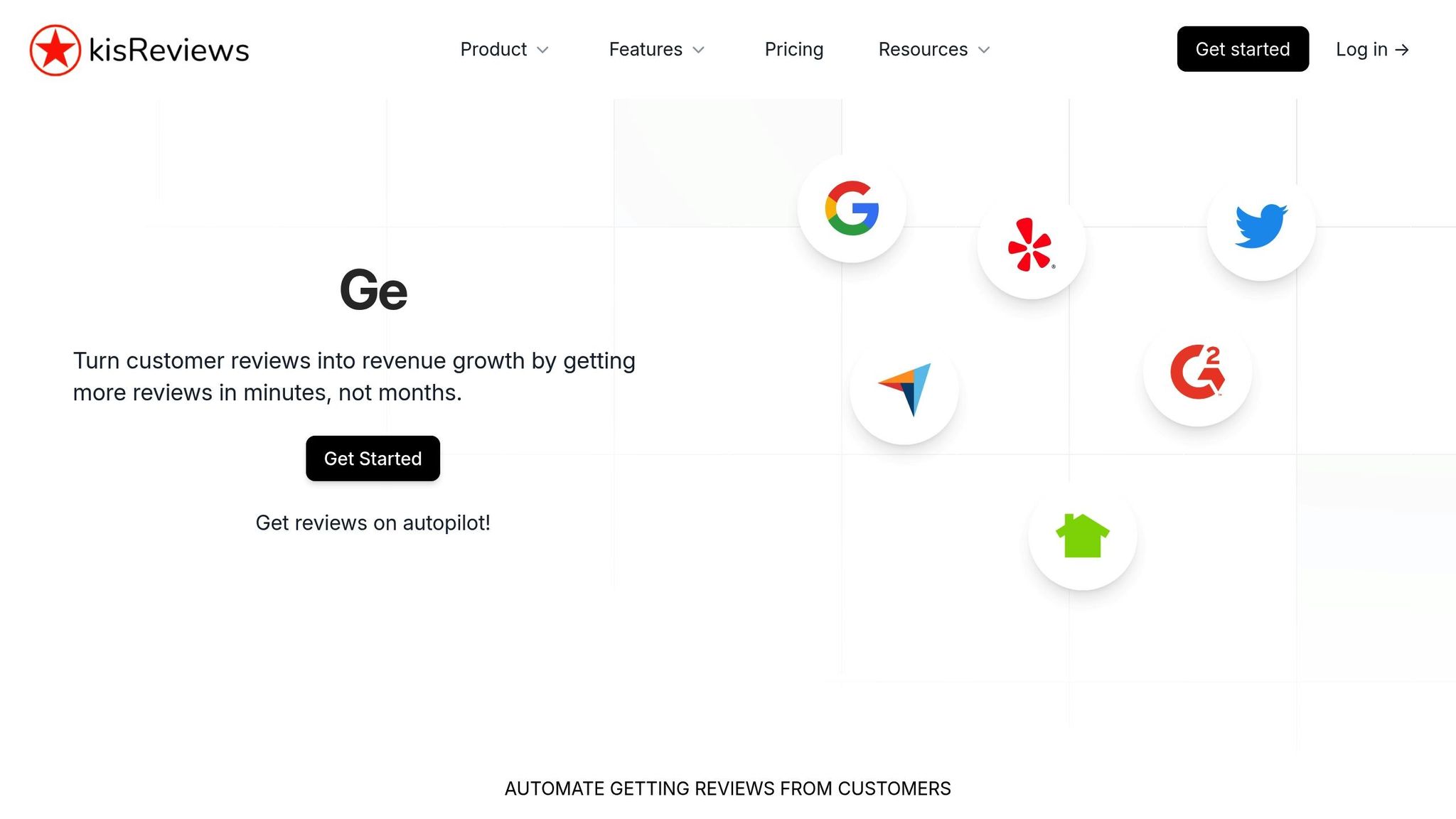
kisReviews is a review management platform designed to turn customer feedback into trust, credibility, and revenue growth. It’s suitable for businesses of all sizes, from small startups to larger enterprises.
What sets kisReviews apart is its blend of easy-to-use, no-code tools and automation. It tackles a common business challenge: collecting genuine customer reviews consistently and showcasing them in ways that enhance brand reputation.
Here’s a closer look at how kisReviews simplifies review management and boosts efficiency.
Automated Review Collection
kisReviews takes the hassle out of gathering customer feedback by automating the entire process. The platform uses three key tools to streamline review collection:
- Custom QR codes placed at key customer touchpoints.
- Centralized landing pages that list all available review platforms.
- No-code website displays that automatically refresh with new reviews.
These tools work together to keep the process hands-free, ensuring businesses always have fresh, up-to-date reviews without the need for constant staff involvement.
Integration with Major Platforms (e.g., Google, Yelp)
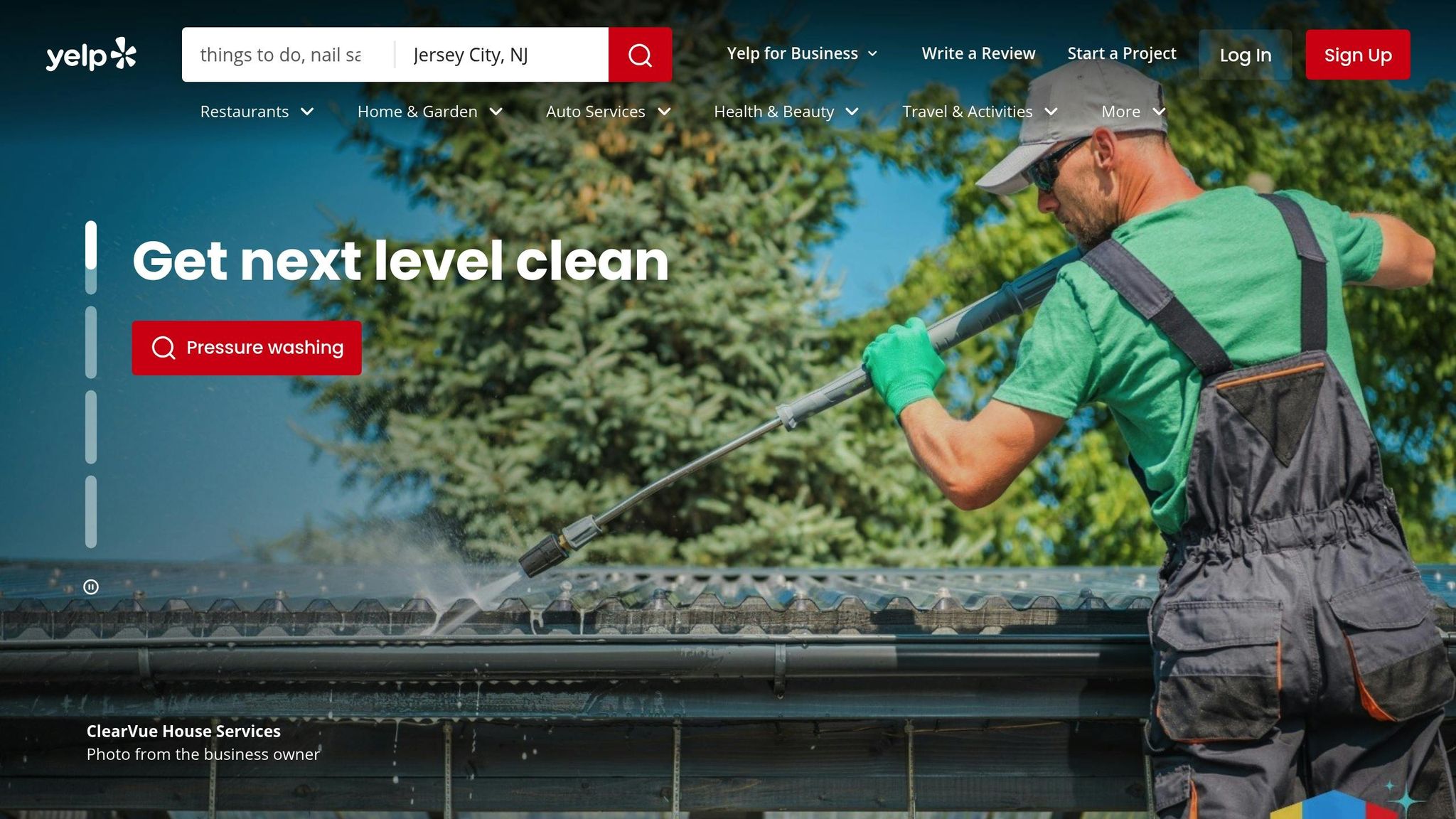
kisReviews integrates directly with major review sites like Google and Yelp, helping businesses maximize their online visibility. For example:
- Google integration boosts local search rankings by guiding customers to leave reviews on Google listings.
- Yelp integration is especially useful for industries like restaurants, retail, and service providers, where customer feedback significantly influences decision-making.
By making it easy for happy customers to share their experiences on popular platforms, kisReviews helps businesses build trust and attract new clients.
Pricing and Scalability for U.S. Businesses
kisReviews offers flexible pricing plans to suit businesses at different stages of growth:
| Plan | Annual Price | Locations | Reviews | Key Features |
|---|---|---|---|---|
| Free | $0 | 1 | 10 text reviews | 2 review platforms, QR codes, landing page |
| Essential | $20 | 2 | Unlimited | Unlimited platforms, QR codes |
| Growth | $50 | 10 | Unlimited | All features, unlimited QR codes |
- The Free plan is perfect for small businesses or those new to review management.
- The Essential plan ($20/month) provides excellent value for growing businesses managing multiple locations.
- The Growth plan ($50/month) suits larger operations, supporting up to 10 locations with unlimited review collection.
Analytics and Reporting Features
kisReviews goes beyond automation with powerful analytics tools that help businesses make smarter decisions.
- Performance analytics reveal which collection methods - like QR codes or landing pages - are most effective, allowing businesses to refine their strategies.
- SEO tracking highlights the benefits of user-generated content, as fresh reviews often include keywords that improve search visibility.
- Customizable reporting helps businesses monitor trends and performance over time. For companies with multiple locations, these reports make it easier to compare results and replicate successful practices.
2. Podium
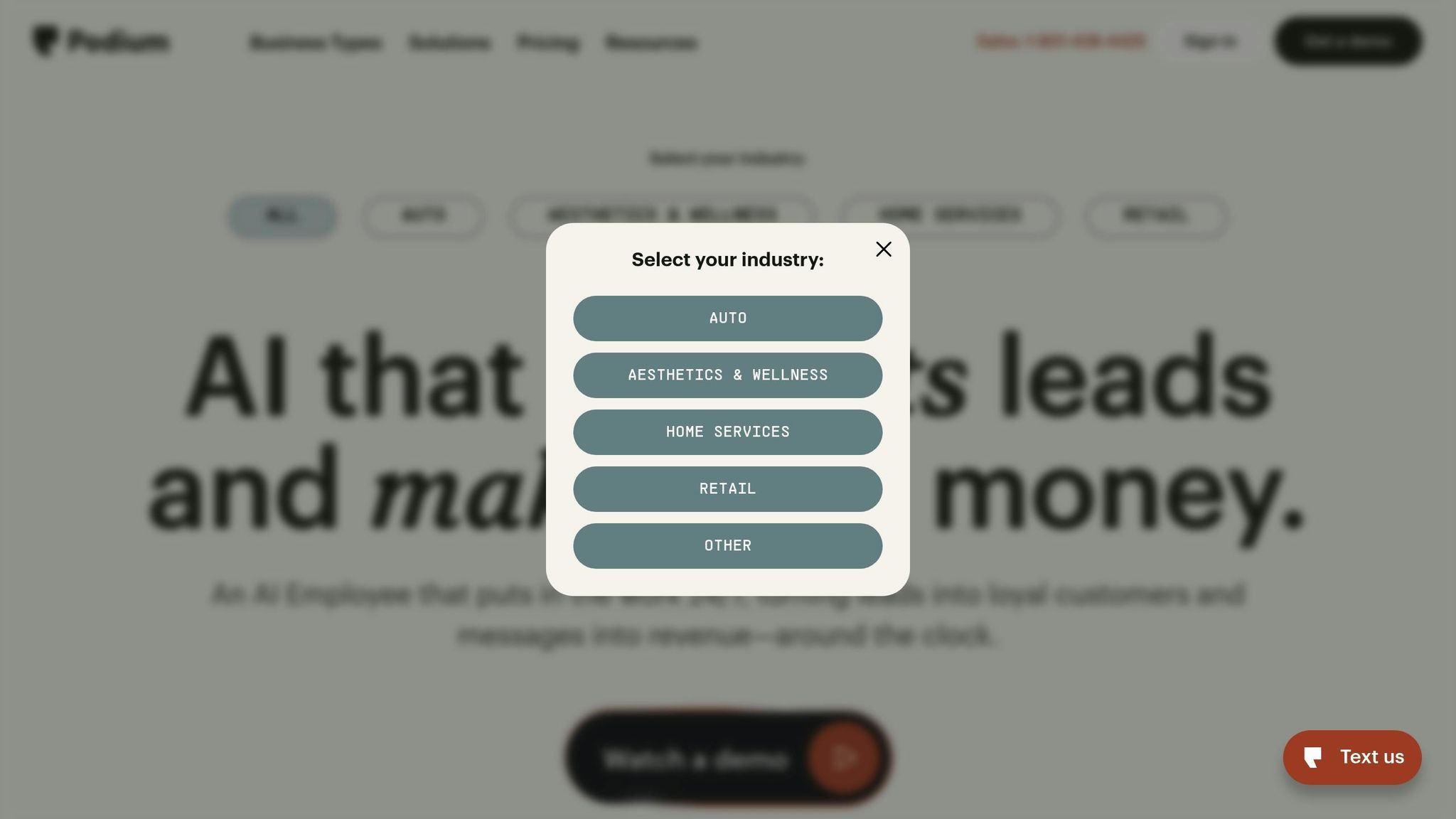
Podium simplifies how businesses manage customer communication and reviews by combining AI Reputation Specialist technology with multi-channel messaging. This approach resonates with many U.S. businesses, especially those whose customers prefer the ease and speed of text messaging for sharing feedback.
Automated Review Collection
Podium takes the hassle out of gathering reviews by automating invitations and follow-ups. It crafts personalized messages that feel natural and engaging, rather than impersonal or robotic. Businesses can set up tailored workflows to send quick texts or emails requesting reviews, while automated follow-ups ensure no opportunity is missed [27,28].
The results speak for themselves. For instance, Bedzzz Express saw an immediate surge in reviews after adopting Podium. Austin Bond, the company’s President, shared:
"We chose Podium Reviews because of ease. And there was a noticeable bump in reviews when we started the automation."
Similarly, Pura Vida Body & Mind Spa experienced a 20x increase in Google reviews. Julie Davis, the spa’s Owner & Founder, explained:
"We absolutely love Podium … We have also had a big increase in receiving Google reviews since we can now easily and quickly send the patient a link at the end of their visit."
These automation tools blend seamlessly with Podium’s broader capabilities, creating a streamlined experience for businesses.
Integration with Major Platforms (e.g., Google, Facebook)
Podium consolidates reviews from platforms like Google and Facebook through its integration with Yext, providing businesses with a unified approach to managing their online reputation.
Power Ford’s success highlights the advantages of this integration. The dealership has held the top spot on DealerRater among Ford dealers for four consecutive years, a feat they attribute in part to Podium. Matt Sneed, Director of Operations at Power Ford, shared:
"We saw results instantly. Our review collection rate went massively up, and so did our score. We've been the number one Ford dealer on DealerRater for four years running, and Podium has been instrumental in that."
Pricing and Scalability for U.S. Businesses
Podium offers three pricing tiers - Core, Pro, and Signature - with costs reflecting its premium features. One reviewer noted an annual cost of around $5,000:
| Plan | Monthly Price | Locations | Users | Additional Locations |
|---|---|---|---|---|
| Core | $399 | Up to 2 | 1–4 | $50/month each |
| Pro | $599 | Up to 5 | Unlimited | $50/month each |
| Signature | Custom | Unlimited | Unlimited | No extra cost |
The Core plan, priced at $399/month, is ideal for small businesses with up to 2 locations. The Pro plan, at $599/month, suits companies managing up to 5 locations, while larger enterprises can opt for the Signature plan, which offers custom pricing and advanced multi-location management.
Despite concerns over cost, Podium boasts a 90% User Satisfaction Rating based on 2,053 reviews, showing that many businesses see value in its features.
Analytics and Reporting Features
Beyond collecting and integrating reviews, Podium provides powerful analytics to help businesses make data-driven decisions. These tools track metrics like review collection rates, response times, and reputation trends across multiple locations. For example, one franchise using Podium across 250+ locations over six years saw its average rating improve from 3 stars to 4.5 stars. These insights enable businesses to identify areas for improvement and maintain a strong online presence.
3. Birdeye
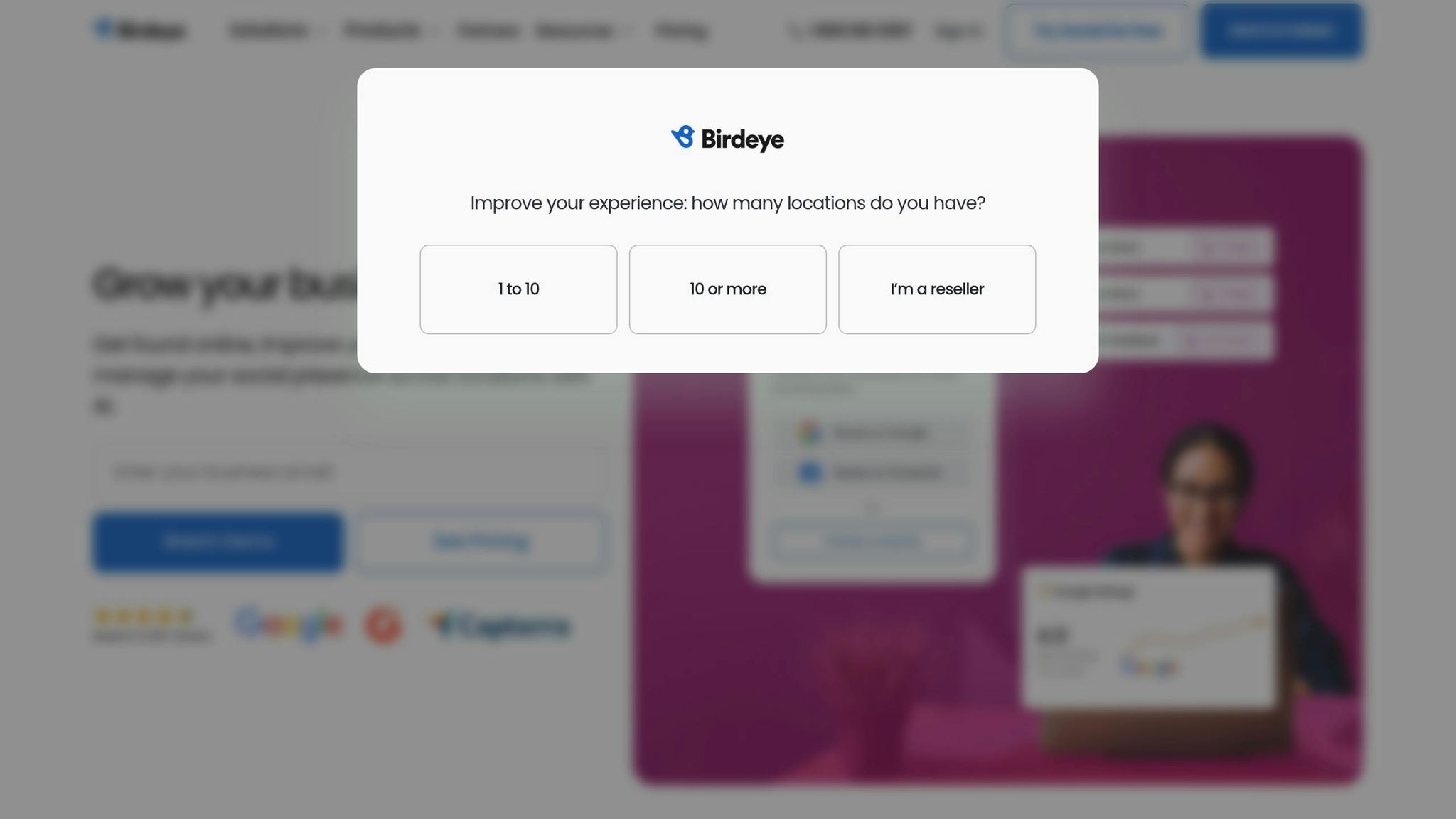
Birdeye is a reputation management platform designed to simplify review collection and deliver detailed analytics, catering specifically to U.S. businesses. Its standout feature? Integration with over 3,000 software systems, making it a fantastic choice for companies juggling multiple tools.
Automated Review Collection
When it comes to collecting reviews, Birdeye takes the manual work out of the process. It automates review requests via email, SMS, or in-app notifications, syncing seamlessly with CRM systems like Salesforce and HubSpot. This ensures businesses never miss an opportunity to gather customer feedback.
A great example of its impact is Complete Care. After adopting Birdeye’s automated review system, they saw a jaw-dropping 3,653% increase in reviews, amassing over 29,650 reviews with an impressive 4.8-star average. Their review request open rate hit 50%, showcasing strong customer engagement.
Birdeye also offers features like QR codes for instant review submissions and the ability to turn survey responses into online reviews. These tools make it easy to integrate with major review platforms and streamline the feedback process.
Integration with Major Platforms (e.g., Google, Yelp)
One of Birdeye’s biggest strengths is its ability to integrate with major review platforms. With Google accounting for 79% of online reviews across industries, this partnership is a game-changer for businesses.
Through its Google integration, Birdeye centralizes the management of Google Business Profiles. Businesses can create Google Posts, monitor reviews, manage Q&A sections, and even access Google’s appointment booking feature. Uday Ghatikar, Field CTO at Google Cloud, highlighted this collaboration:
"When we look at the larger Google ecosystem, it is quite extensive, and it can be quite difficult for individual businesses to navigate. And Birdeye plays an important role in the middle as one of our most integrated partners."
Birdeye’s Yelp integration offers similar benefits, allowing businesses to monitor and respond to reviews across multiple locations from a single dashboard. Considering Yelp’s 32 million active mobile users and 287 million reviews as of December 31, 2023, this feature helps businesses connect with a massive audience.
Pricing and Scalability for U.S. Businesses
Birdeye’s pricing is structured to suit businesses of various sizes, with three tiers:
| Plan | Monthly Price | Best For |
|---|---|---|
| Starter | $299 | Small businesses new to review management |
| Growth | $399 | Expanding businesses needing extra tools |
| Dominate | $499 | Large enterprises with complex needs |
With a 4.7 out of 5 rating on Software Advice and recognition as a leader on the G2 Grid for Online Reputation Management Software, Birdeye has earned high praise. In fact, 95% of users recommend the platform, though some small businesses may find its extensive features a bit overwhelming.
Analytics and Reporting Features
Birdeye doesn’t just collect reviews - it helps businesses make sense of them. Its robust reporting tools consolidate data from customer interactions, offering both real-time and historical insights.
For instance, Southern Careers Institute used Birdeye’s analytics to tailor strategies for each campus. Justin Shook, their Director of Social Media and Strategy, shared:
"When the reports are extremely helpful and quick to pull. They are GREAT to show my executive team a quick snapshot of our reputation improvements, opportunities and how we are addressing them. These features made my job much easier in showing my CEO and COO that Birdeye is worth the investment."
The platform tracks everything from individual location performance to Google Business Profile metrics, Net Promoter Scores, and employee response times. Social media managers can also monitor follower growth and post performance, helping fine-tune their strategies.
Cunningham Restaurant Group used these insights to adapt their menus based on customer feedback, ensuring their dishes matched guest preferences. By tracking response times and rates, businesses can maintain consistent service standards across locations. Companies using Birdeye’s analytics often see a 25% boost in ROI, while those focusing on customer feedback report 2.5 times higher revenue growth.
4. Yotpo
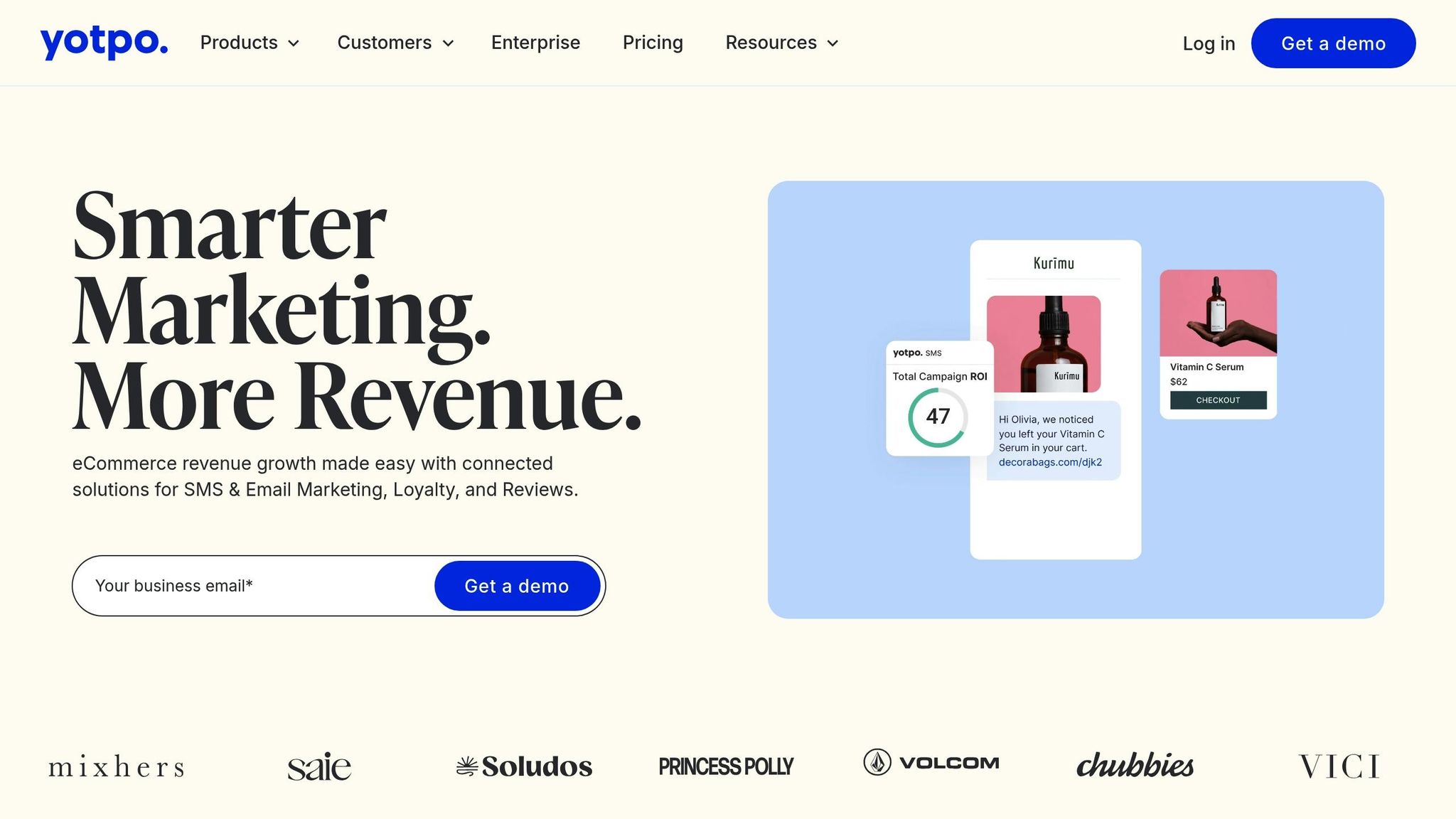
Yotpo is an eCommerce platform that combines review management with loyalty programs, SMS, and email campaigns to create a smooth and unified customer experience. Like other platforms in its category, Yotpo focuses on automation and delivering insights to simplify review management.
Automated Review Collection
Yotpo takes the hassle out of gathering customer feedback with its automated review collection tools. By automating review requests, businesses can save time and improve efficiency. One standout feature is its SMS review requests, which boast a 66% higher conversion rate compared to email requests. Plus, with 98% of text messages being opened, SMS provides a direct and effective way to engage with customers.
The platform also supports shareable links that can be sent via email, text, social media, or even QR codes. These requests are triggered based on delivery dates, ensuring customers have enough time to use the product before being asked for feedback.
Yotpo's Smart Prompts suggest topics that encourage shoppers to write high-converting reviews. Meanwhile, its 2-in-1 Review Requests allow businesses to collect both product and site reviews in one email flow. Shopify users who adopt these tools see a 15% increase in customer reviews, and displaying these reviews prominently on product pages can boost conversion rates by up to 68%.
Integration with Major Platforms
One of Yotpo's key strengths is its ability to integrate seamlessly with leading eCommerce platforms and marketing tools. It works with Shopify, Shopify Plus, BigCommerce, Adobe Commerce (Magento), WooCommerce, Salesforce Commerce Cloud, and custom eCommerce setups through API integrations. Additionally, it connects with hundreds of marketing platforms like Klaviyo and Gorgias, making data synchronization and customer segmentation much easier.
Yotpo also supports review syndication with platforms like Google Shopping, Facebook, TikTok Shop, Target, and Walmart. This broad network helps businesses gain visibility and credibility across multiple channels - especially important as 98% of consumers read online reviews before making a purchase.
A great example of Yotpo's integration in action is Chubbies, a men's clothing brand. By using Yotpo's integration with Shopify's POS system, they extended their loyalty programs from online to their physical stores. Tom Montgomery, Co-Founder and Chief Marketing Officer of Chubbies, shared:
"Our customers feel like they're getting a full lifecycle experience."
Pricing and Scalability for U.S. Businesses
Yotpo’s pricing structure is designed to accommodate businesses of all sizes, with tiered plans based on monthly order volume. This makes it accessible to smaller businesses while also offering advanced features for larger enterprises.
| Plan | Monthly Price | Order Volume | Best For |
|---|---|---|---|
| Free | $0 | Up to 50 orders | Small businesses testing the waters |
| Starter | $15 | Up to 500 orders | Small businesses getting started |
| Pro | $169 | Variable pricing | Growing businesses needing more tools |
| Premium | Custom | No restrictions | Enterprises with complex requirements |
For businesses looking to access Yotpo's full product suite, the Pro plan starts at $368/month, while the Premium plan begins at $941/month. Enterprise plans with custom pricing are available for companies handling 10,000+ monthly orders.
While Yotpo is praised for its user-friendly interface and Shopify integration, some users point out that its free features are limited and its pricing is higher than some competitors. Additionally, the lack of multi-language support may deter international businesses.
Analytics and Reporting Features
Yotpo turns customer reviews into actionable insights, helping businesses refine their strategies. The platform provides analytics to track key metrics like conversion rates, customer lifetime value, and the impact of user-generated content on sales.
Kim Zorn, Global Performance Director, highlighted the importance of customer feedback:
"Customer reviews are invaluable. As a brand, we know so much more about our products and what the customers actually want."
These insights help businesses identify which products resonate most with customers and why. By leveraging this data, companies can run targeted campaigns and create personalized experiences.
Graham Paddon, Head of Customer Experience, summed it up:
"Shoppers find genuine customer experiences invaluable. It's a game changer, crucial to our performance."
Businesses using Yotpo’s reporting tools often see better customer retention and higher average order values, as they gain a deeper understanding of their audience and what drives their purchasing decisions.
5. Trustpilot
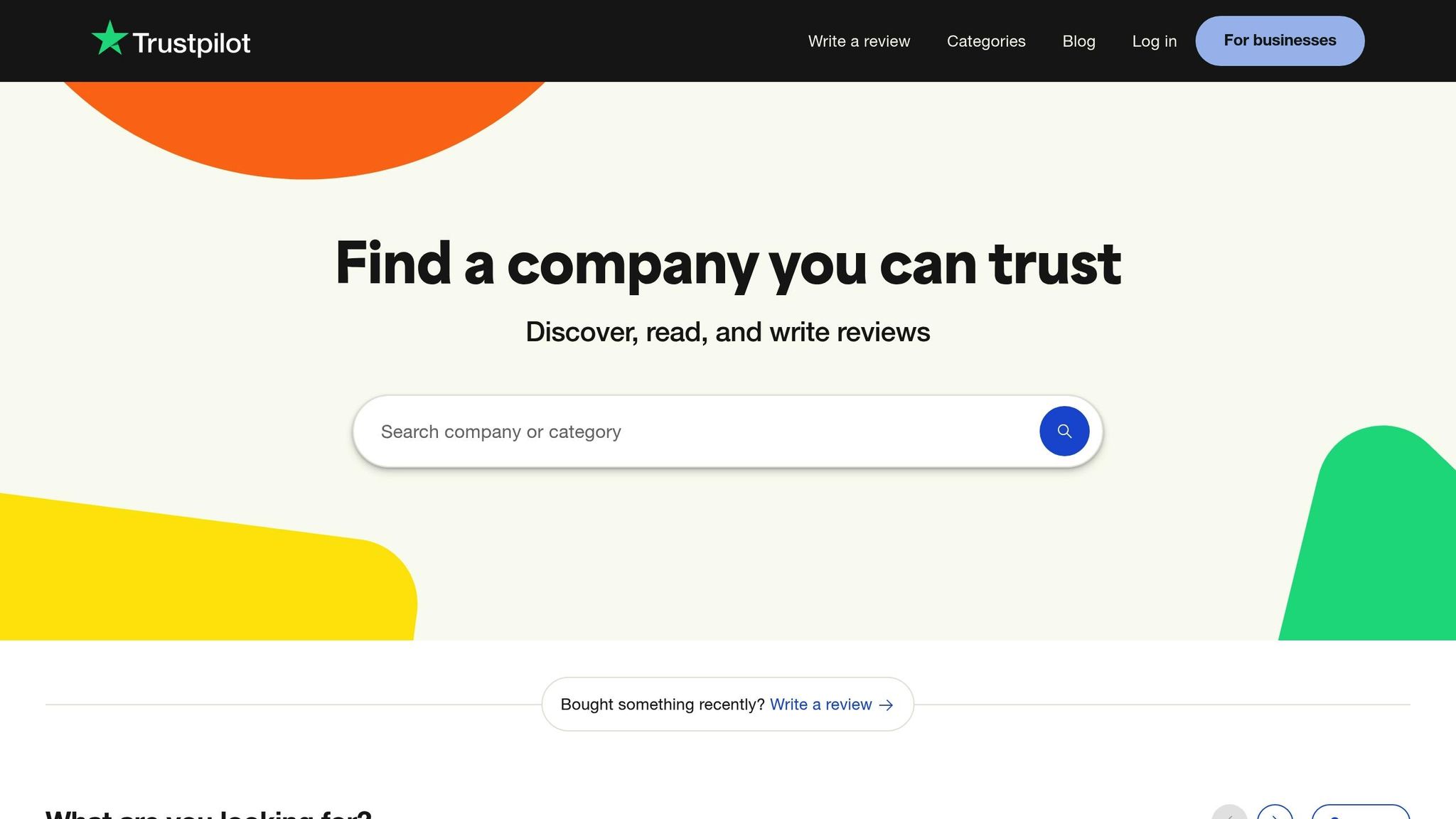
Trustpilot is a platform designed to help businesses manage reviews and build trust through customer feedback. With over 4 million new reviews submitted every month, it’s a powerful tool for showcasing your reputation and connecting with potential customers across various channels.
Automated Review Collection
Trustpilot simplifies the process of gathering customer feedback by automating review invitations through email, ensuring timely and authentic responses. To maintain credibility, its fraud detection system screens reviews for authenticity, enabling businesses to focus on actionable feedback for improvement.
Research highlights the importance of responsiveness: 88% of consumers are more likely to use a business that replies to all reviews, compared to just 47% who would not. Additionally, 64% of consumers in the US, UK, and France prefer to buy from a company that engages with its reviews rather than one that seems flawless. These features make Trustpilot a reliable choice for integrating feedback into your broader strategy.
Integration with Major Platforms
Trustpilot connects seamlessly with major platforms, offering businesses a range of benefits. For instance, it integrates with Google, allowing verified reviews to contribute to Google Seller Ratings, which can increase click-through rates on Google ads by up to 10%. Featuring review stars in search results can further boost click-through rates by as much as 35%. The platform also integrates with Bing, Salesforce for CRM centralization, and Meta for Business. Additionally, its Image Generator tool makes it easy to share reviews on social media.
The impact of Trustpilot reviews is clear: 71% of US consumers surveyed in 2022 said a good Trustpilot score makes them more likely to buy from a brand, while 73.6% of Trustpilot visitors reported being more inclined to purchase from websites displaying Trustpilot reviews.
Pricing and Scalability for U.S. Businesses
Trustpilot offers flexible pricing plans to suit businesses of all sizes. These plans are billed annually and are structured per domain:
| Plan | Monthly Price | Automated Invitations | Best For |
|---|---|---|---|
| Plus | $299 | 200 monthly | Small to medium businesses |
| Premium | $629 | 500 monthly | Growing businesses |
| Advanced | $1,099 | 5,000 monthly | Large businesses |
| Enterprise | Custom pricing | Unlimited | Enterprise organizations |
With an overall rating of 4.5, users often praise Trustpilot’s intuitive interface and useful features. However, some have noted that key features are accessible only through higher-tier plans.
Analytics and Reporting Features
Trustpilot transforms customer feedback into actionable insights using its AI-powered Review Insights. This tool analyzes over 100 million reviews to identify sentiment and trends. The platform’s dashboard offers an overview of performance metrics, while the analytics explorer reveals deeper trends, and review tags provide segmented performance data.
Nathan Reid from uShip shared his thoughts on Trustpilot’s analytics:
"My favorite feature on Trustpilot - as far as a data nerd - I'd have to say the Dashboard and also the statistics module. It's a place you can very quickly tap into what's going on with your feedback and not only have a lot of stats and understanding at your fingertips... but it also makes it really easy to dial in to exactly what's happening."
Recent feedback highlights how businesses are benefiting from Trustpilot’s features. In July 2024, Diana praised the platform’s customization options, which allow businesses to align review invitations and responses with their brand’s voice. Amy Garcia noted that sharing reviews directly to social media has been transformative for their online marketing strategy. Similarly, Dylan W shared in June 2024 that Trustpilot’s CRM integration has significantly streamlined review management, saving both time and resources.
6. ReviewTrackers
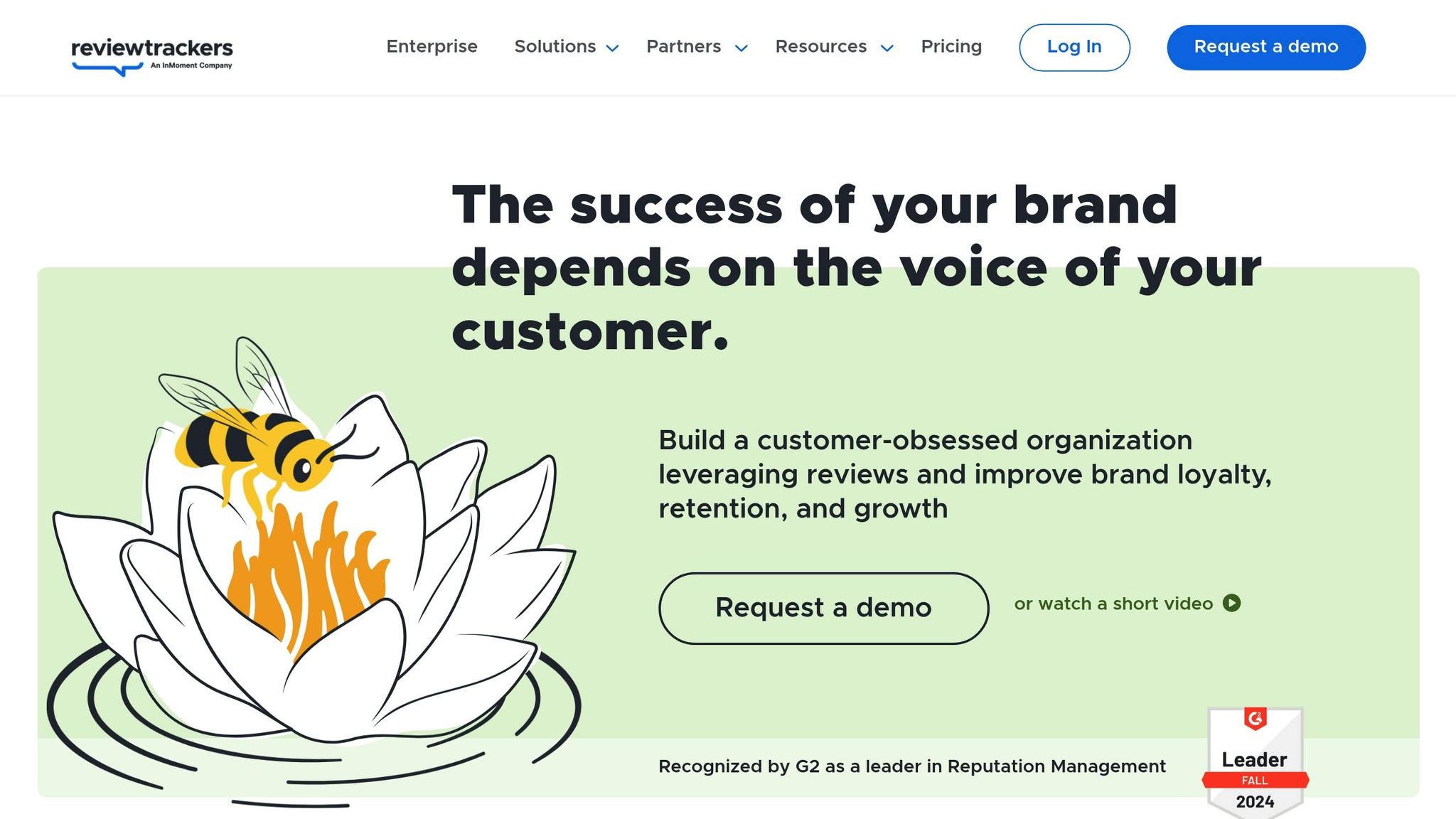
ReviewTrackers is a tool designed to help businesses manage their reputation across more than 100 review sites. With automated features and detailed analytics, it simplifies the process of gathering and analyzing customer feedback.
Automated Review Collection
ReviewTrackers streamlines the process of collecting reviews through automated email and SMS campaigns. Its Ask Tool uses templates and drip campaigns to encourage customers to leave reviews, increasing overall review volume. Additionally, its API integrates with CRMs, enabling businesses to send review requests automatically after transactions. For example, Ziebart, an automotive aftermarket service provider, connected the ReviewTrackers API to its point-of-sale system. This allowed Ziebart to automate review and feedback requests across its franchise network. These automated processes make it easier for businesses to engage with customers and improve their online presence. Interestingly, 45% of consumers are more inclined to visit a business when they see owners actively responding to reviews.
Integration with Major Platforms
ReviewTrackers connects seamlessly with major review platforms and business tools, creating a unified experience. Key integrations include Google My Business, Apple Business Connect, Facebook, and Hootsuite. Through Zapier, it also links to over 2,000 additional apps. The Google integration stands out, as 63.6% of consumers check Google reviews before deciding to visit a business. Chris Campbell, the Founder of ReviewTrackers, emphasized the importance of this partnership:
"Expanding our partnership with Google and being selected to join the Google My Business Featured Partners Program is a big step in helping our customers strengthen their digital footprint."
The Apple Business Connect integration ensures businesses maintain accurate information across Apple Maps, Siri, and other Apple applications. Meanwhile, the Hootsuite integration simplifies monitoring social media and reviews in one place. Highlighting its impact on the restaurant industry, Jon Morin, VP of Product Management at OpenTable, shared:
"Feedback comes from so many different places, it can be overwhelming to manage it all. We know that's a tall order, so we've partnered with ReviewTrackers to help our network of restaurants address customer feedback quickly, all directly in OpenTable."
Analytics and Reporting Features
ReviewTrackers doesn’t stop at collecting reviews - it offers powerful analytics to turn feedback into actionable insights. Using natural language processing (NLP), the platform identifies trends and customer sentiment. Its AI-driven keyword categorization helps businesses track recurring themes in feedback. The Reputation Scorecard provides a snapshot of brand performance, measuring metrics like review volume, average ratings, response rates, and response times. Additionally, the Customer Experience Analytics tool allows users to filter data by date and source, creating custom reports.
For example, retail brand evo analyzed over 6,000 reviews using ReviewTrackers’ analytics, leading to a 12% boost in customer satisfaction compared to previous benchmarks.
The platform’s analytical capabilities have earned high praise, including a 4.7 out of 5 rating from Research.com and recognition as a leader in reputation management by G2. Users have also highlighted its value:
"The review management and analysis tools are top notch! They provide key insights into the customer experience and allow us to evaluate how we compare to other brands in our industry." - James B., Restaurants
Another reviewer from the restaurant industry noted its practical features:
"The two things I appreciate most about review tracker are one, a single place that collects the reviews I need to respond to and share with my team and two, easy to produce metrics that I can share with my team so we can discuss areas of opportunity and successes." - Verified Reviewer, Restaurants
7. Grade.us
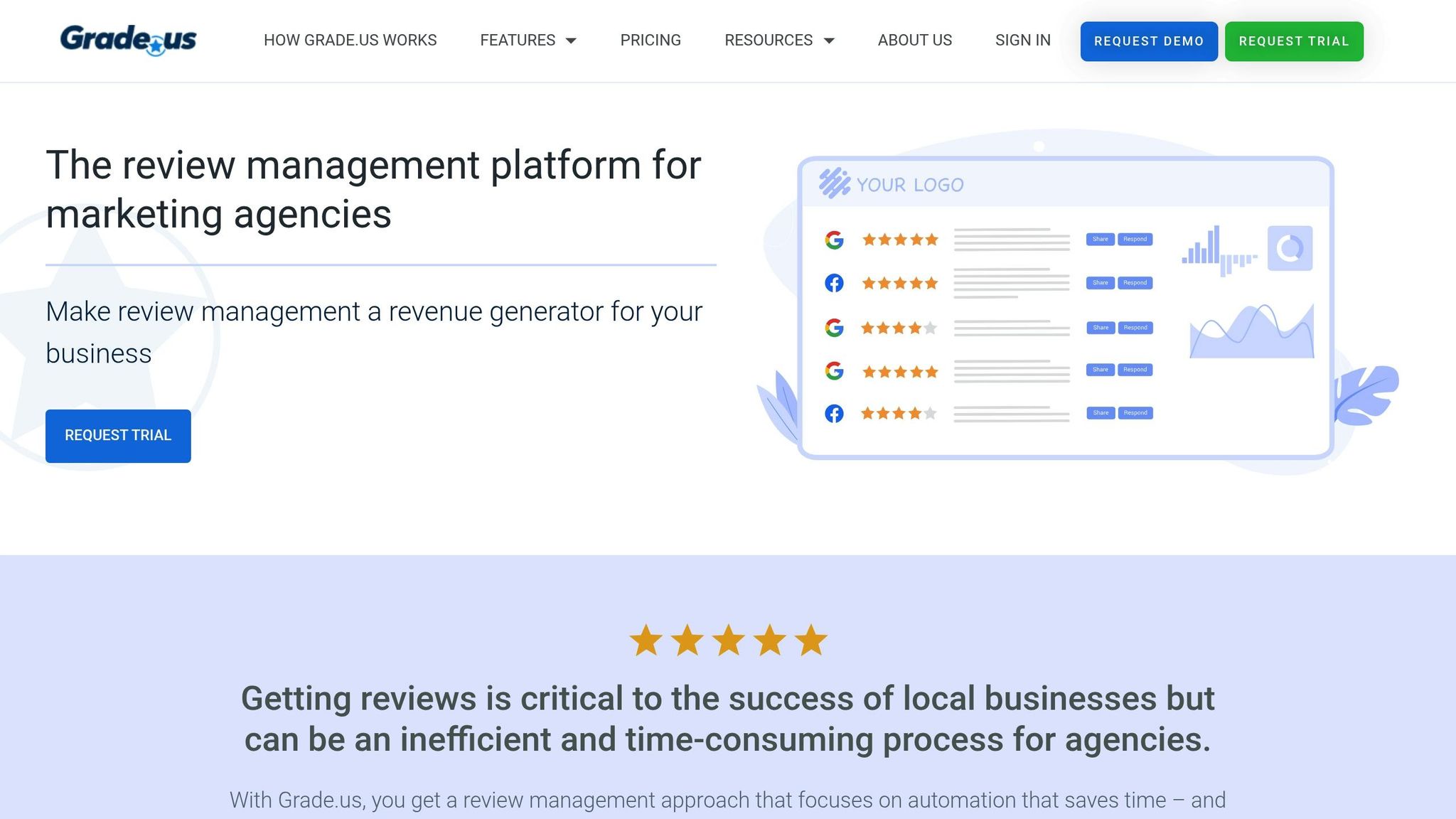
Grade.us is crafted for agencies handling a variety of client accounts, offering a white-label review management platform. Unlike tools that cater to individual brands, Grade.us allows agencies to rebrand the platform as their own and provide it as a service to their clients.
Automated Review Collection
The platform simplifies review collection through automated email and SMS campaigns. These campaigns can be tailored with drip sequences and even include features like duplicate recipient removal. Businesses also have the option to design custom review landing pages, making it easier for customers to leave feedback across multiple platforms.
Grade.us integrates with Zapier, enabling automated review requests triggered by specific customer actions or business events. For instance, you can set it up to request reviews right after a purchase or when a service is completed. The automation extends to managing campaigns, with rules for sending follow-ups to ensure no opportunity for feedback is missed.
"With Grade.us, you get a review management approach that focuses on automation that saves time – and customization that lets you market and leverage our platform as an added service and value to your clients."
– Grade.us
This focus on automation ensures the platform works seamlessly with major review sites and tools.
Integration with Major Platforms
Grade.us connects with Google My Business to monitor reviews and send instant notifications when feedback is posted. Its Facebook integration not only tracks new recommendations but also allows businesses to share positive reviews automatically on their Facebook pages, boosting visibility.
The platform supports review collection from over 100 sites, including big names like Google, Facebook, and Yelp, as well as niche platforms like Healthgrades for healthcare, TripAdvisor for hospitality, Zillow for real estate, and Avvo for legal services. Additionally, Grade.us integrates with tools like Google Sheets, Constant Contact, Salesforce, Mailchimp, HubSpot, and QuickBooks Online. These integrations make it easy to trigger review campaigns directly from your existing workflows.
By combining these integrations with its automation features, Grade.us ensures efficient and streamlined review management across various platforms.
Pricing and Scalability for U.S. Businesses
Grade.us offers pricing plans designed to scale with agency needs. Plans start at $25.00 per month, with options like Solo ($110 per user monthly), Professional ($60 per user monthly), and Agency ($40 per user monthly). Agencies can also request custom pricing through Partner plans.
White-label features are included with the Agency plan and higher tiers, while advanced white-label options cost an additional $440 annually (free for accounts with 100 seats). Text message campaigns are available for $10 per month, covering 200 SMS requests.
The platform's scalability allows agencies to achieve profit margins of up to 70% on resales.
User reviews consistently praise Grade.us, with an average rating of 4.8 out of 5 on platforms like Capterra, Software Advice, and GetApp, each based on 250 reviews.
Michael, a verified reviewer, shared:
"Grade.us has best balance of features vs. cost that I've found on the market, and it excels at the most important task - helping the business or organization acquire reviews."
Julie, another verified reviewer, added:
"Best review software at the best price. We white label the platform and resell it to our clients, and have looked at lots of options. Not only is Grade.us the least expensive, it has all the features we could ask for."
8. Reputation.com
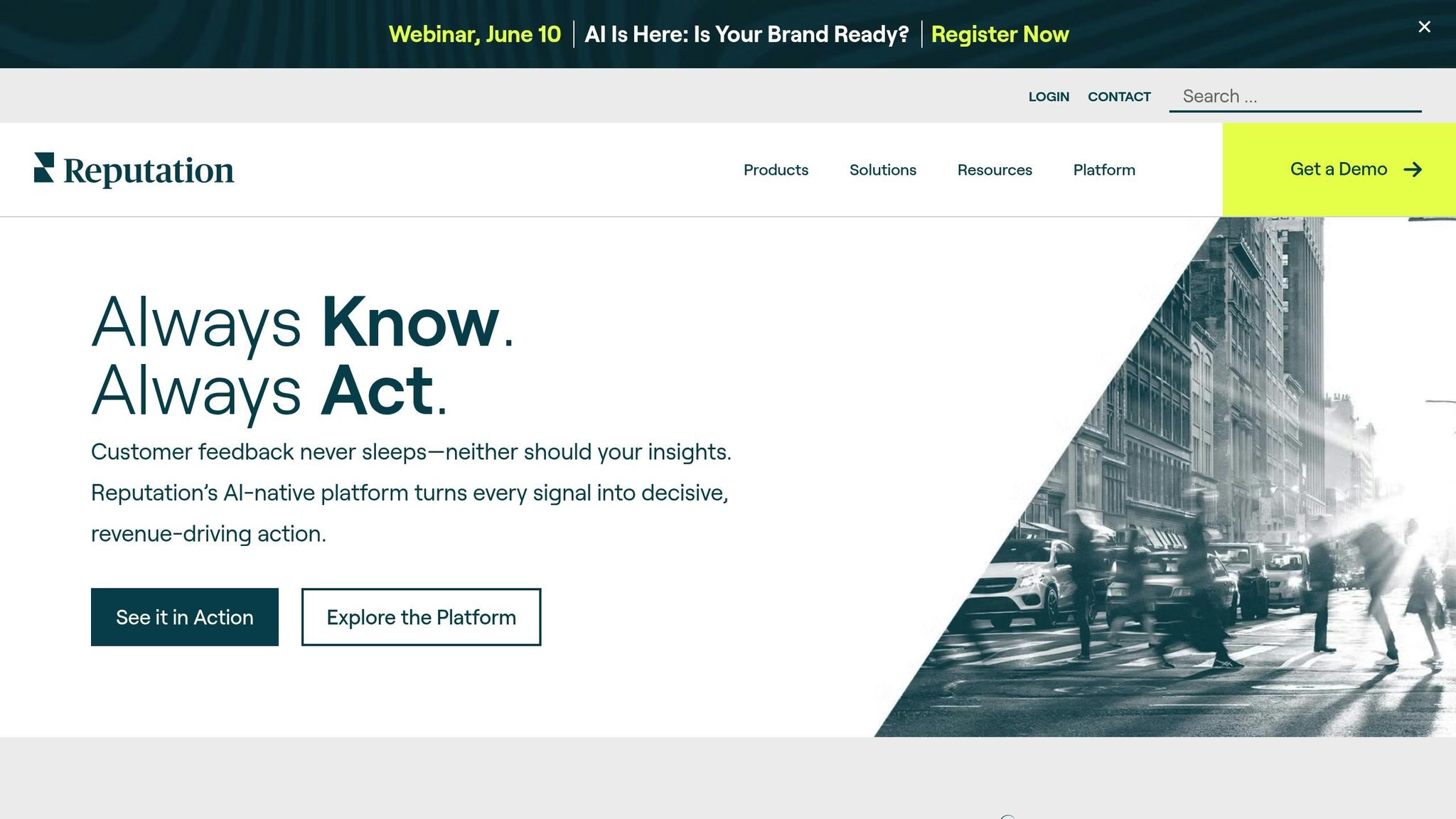
Reputation.com is designed as a platform for larger enterprises, especially those with multiple locations, to centralize and manage customer feedback from various online sources. By combining review management with reputation monitoring, it provides businesses with a comprehensive view of their public image.
Automated Review Collection
Reputation.com's Automated Review Collection (ARC) simplifies the process of gathering customer reviews. It sends out email or SMS requests using either custom or template messages, seamlessly integrating with CRM systems. This allows businesses to automate review campaigns, using follow-ups to encourage feedback and targeting high-impact review sites through a patented methodology. Additionally, its private API partnership with Google streamlines the review generation process even further. The platform's mobile app - available for iOS and Android - lets team members request reviews directly from their mobile devices at the point of service.
Businesses can use a variety of touchpoints to deploy automated review requests, such as websites, email campaigns, SMS messages, or even kiosks at service locations. These tools allow for real-time tracking of conversion rates, helping businesses identify the most effective strategies. This level of automation ensures smooth integration with major review platforms.
Integration with Major Platforms
Reputation.com makes it easy for businesses to manage reviews and listings on platforms like Google and Yelp, which can improve local SEO and build customer trust.
The platform’s Review Booster, introduced in 2020, helps businesses quickly increase public reviews. Clients have reported up to a 100% boost in positive review volume, with some seeing 30–40% improvements in search rankings and review generation almost immediately. Unlike some competitors, Reputation.com does not require paid partnerships with Yelp, making it more accessible to businesses of different sizes.
The impact of reviews on search visibility is significant - 79% of Google's Local 3-Pack ranking factors are influenced by reviews, business listings, and social engagement. Reputation.com’s tools help businesses optimize these factors to strengthen their online presence.
Analytics and Reporting Features
Reputation.com’s analytics tools offer businesses a clear and actionable way to understand feedback. Through a unified dashboard, users can access data from customer reviews, surveys, business listings, social media monitoring, and more. The platform consolidates this information into easy-to-read reports, complete with recommendations for improvement. Businesses can benchmark their performance against competitors at different levels - whether by industry, brand, or location. The Reputation Score even takes local market conditions into account to provide competitive insights.
Users frequently highlight the platform’s reporting tools for their clarity and customization. For instance, a national retailer saw a 67% increase in positive reviews after rolling out Reputation.com's integrated survey system across 1,200 U.S. locations. As a result, nearly 80% of its stores ranked among the top three in Google Search results [46].
The analytics also include thematic analysis, helping businesses identify trends and sentiment patterns in customer feedback. This comprehensive view enables companies to spot areas for improvement, amplify positive customer stories, and ultimately drive revenue growth.
"Reputation helps me plan out my social media posts by laying them out in a way that is convenient to know when I should be scheduling the next ones. They have also helped my customer service language with the automated responses to reviews."
– Alissa H, G2
9. NiceJob
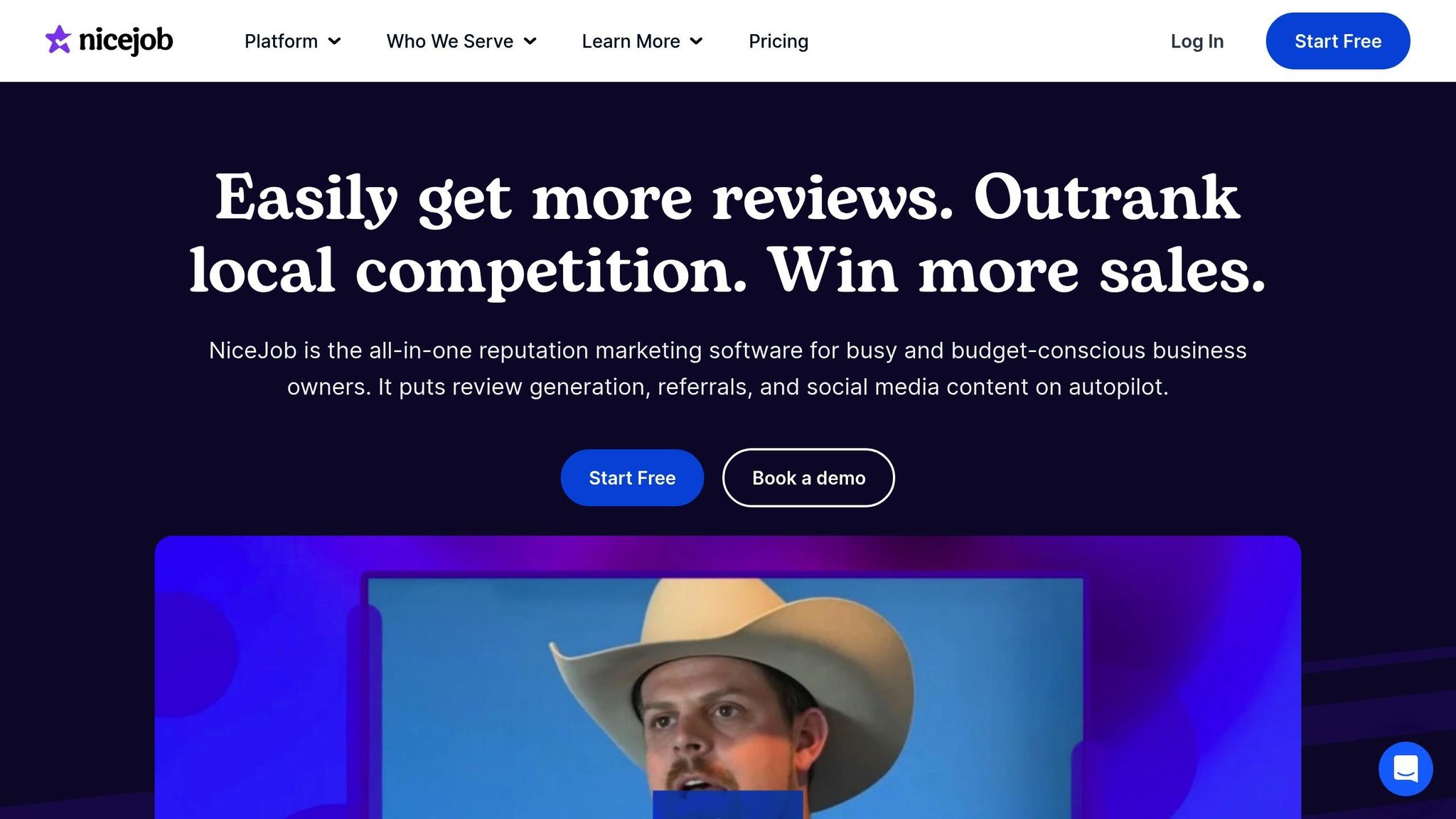
NiceJob markets itself as a comprehensive reputation management tool tailored for busy, cost-conscious business owners. By automating review generation, referrals, and social media content, it’s a go-to option for small and medium-sized businesses across the United States. With over 50,000 businesses served and an impressive 1.7 million reviews generated, NiceJob has become a trusted resource for companies aiming to simplify their reputation management process [106, 107].
Automated Review Collection
One of NiceJob’s standout features is its automated review collection system. After a transaction or service is completed, the platform sends review requests via email or SMS, saving businesses from the hassle of manual follow-ups. Its smart reminder system ensures requests are sent at optimal times, increasing the likelihood of customer responses. Businesses can also customize these invites to match their brand’s voice, creating a more personal connection with their audience.
On average, users experience a fourfold increase in reviews [102, 103]. This automation is especially beneficial for service-oriented businesses that need a steady stream of reviews but lack the time or resources to manage the process manually. Plus, it integrates seamlessly with other tools, making it even easier to manage.
Integration with Major Platforms
NiceJob doesn’t just collect reviews; it ensures they’re visible where it matters most. The platform automatically distributes reviews to key sites like Google Business Profile and Facebook. Additionally, it integrates with widely used business apps such as Jobber, HouseCall Pro, FieldPulse, Zendesk, QuickBooks, and Zapier. This allows for automatic customer importing and a smoother review collection process [101, 106].
Businesses like G.I. Junk Removal, Master Pro Services, and Aria Exterior Cleaning have seen significant growth in their review numbers thanks to NiceJob. By widening the reach of customer feedback, the platform helps businesses build a stronger, more unified reputation.
"Using NiceJob to ask for customer reviews almost always gets results. I have tried asking for reviews by other means and received significantly less of them. I believe they make it easy for the customers to write the reviews."
– Marta Garland
Pricing and Scalability for U.S. Businesses
NiceJob’s pricing is designed with small businesses in mind, offering straightforward plans. The Reviews plan is $75 per month and includes automated review invitations for up to 10 review platforms. For those seeking more advanced features, the Pro plan is available at $125 per month, which includes everything in the Reviews plan plus additional tools. This pricing model makes NiceJob accessible to a wide range of businesses, from single-location service providers to larger operations with multiple locations, without the need for a complex enterprise solution.
Analytics and Reporting Features
NiceJob doesn’t stop at reviews - it also provides powerful analytics to help businesses understand their performance. The platform delivers insights into review trends, customer engagement, and overall campaign effectiveness. Features like conversion tracking, sentiment analysis, and competitor benchmarking allow businesses to gauge their market position [101, 105]. Additionally, customizable and exportable reports make it easy to track internal progress, while real-time notifications and opportunities reports help businesses stay proactive.
These tools enable companies to transform review data into actionable strategies, improving their reputation and attracting more customers.
"Awesome service. Easy to use, instant results and the support team is A+. No brainer. Excellent value. Messaging on the client side is organic and professional. Would recommend NiceJob to any company that wants more customer reviews at a low price with minimal resource allocation."
– Chris Hildebrand, Portal West Seattle Concrete
10. Signpost
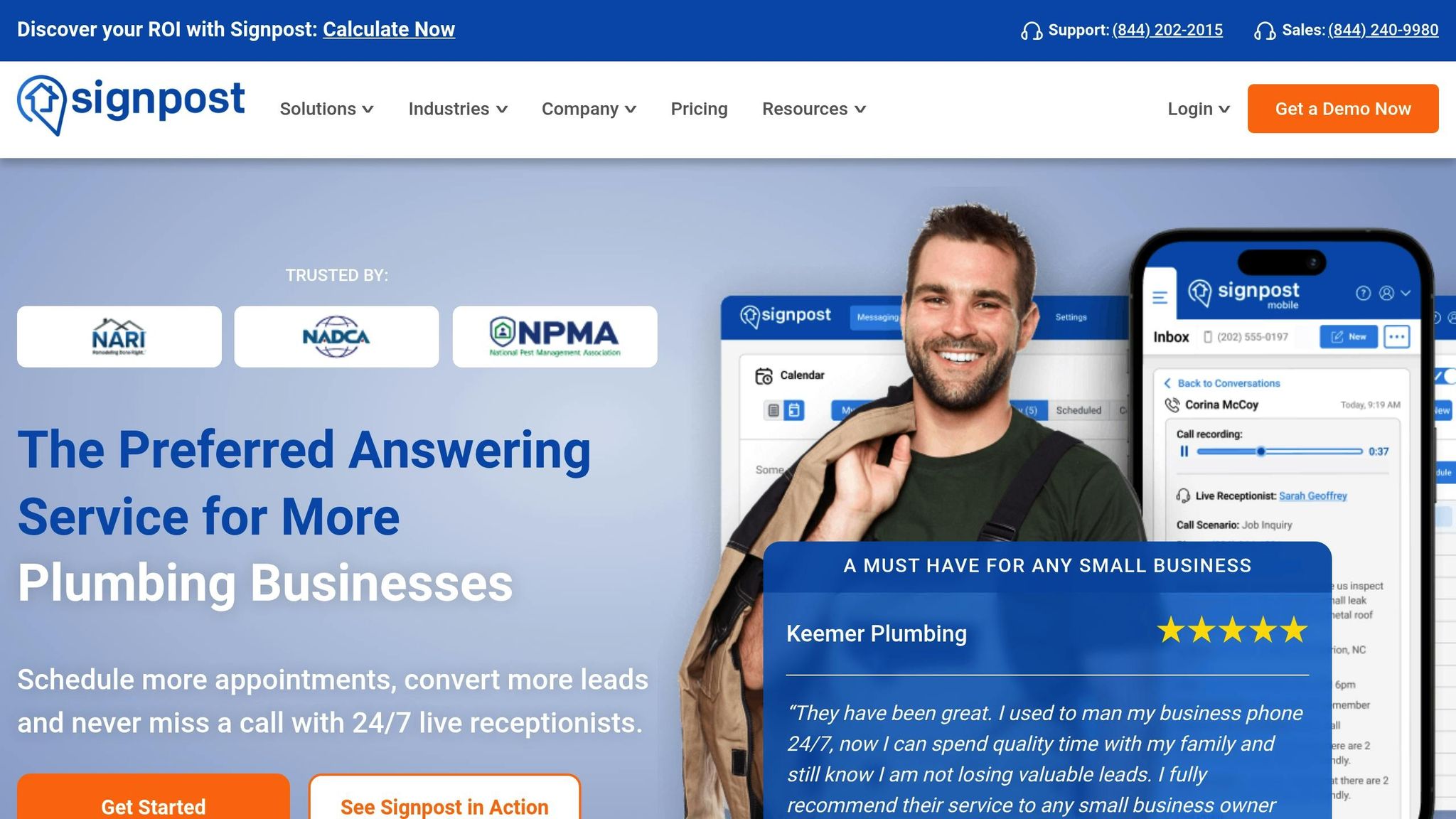
Signpost simplifies how businesses handle customer feedback and reviews by automating the entire process. One user even called it a "priceless employee" for its ability to re-engage past customers and generate positive reviews effectively.
Automated Review Collection
Signpost’s marketing engine uses customer data from emails, calls, and transactions to encourage reviews. Its "Mia" system adjusts campaign frequency and directs happy customers to key review platforms with just one click, making it easier for businesses to gather positive feedback. Many users have reported noticeable growth in their online reviews thanks to this streamlined system.
Integration with Major Platforms
Signpost connects effortlessly with various customer communication tools, including phones, SMS systems, payment platforms, and social media. It also works with industry-specific CRMs, accounting software, and payment systems, making it a flexible choice for different business operations. Additionally, Signpost integrates directly with major review sites like Google and Yelp, ensuring that reviews land where they matter most. Users have praised its compatibility with platforms like QuickBooks and Constant Contact, describing the integration as straightforward. The platform even supports automated chat features for websites, improving how businesses communicate with their customers. This level of connectivity is especially valuable, considering that over 90% of U.S. businesses fall into the small and medium-sized category.
Pricing and Scalability for U.S. Businesses
Signpost offers tiered pricing to suit businesses of various sizes.
- Starter Plan: Costs $249 per month and includes tools for generating reviews, instant responses to calls and messages, and sending newsletters and promotional campaigns.
- Growth Plan: Priced at $399 per month, this plan adds 50 Live Receptionist minutes to the Starter features.
- Accelerate Plan: At $494 per month, this option includes 100 Live Receptionist minutes and all features from the Starter Plan.
While some small businesses might find the pricing steep, the platform has a 3.8/5 value rating, reflecting generally positive feedback from users.
"Hiring Signpost is like hiring another employee just to keep in touch with our past customers to ensure each one is still satisfied with our service. What a priceless tool for small business." – Bretton A, Business Owner
That said, not all reviews are glowing. A general manager in the consumer electronics industry mentioned that the costs could be challenging for smaller companies. Still, Signpost’s scalability allows businesses to adapt its tools as they grow and evolve.
For a quick comparison of review management tools, check out the feature comparison table in the next section.
Feature Comparison Table
Here’s a detailed comparison table that highlights key features across various review management platforms. This side-by-side look will help you weigh pricing, features, integrations, and ideal use cases, making it easier to choose the right software for your needs.
| Software | Starting Price (USD/month) | Key Features | Notable Integrations | Best For |
|---|---|---|---|---|
| kisReviews | Free (Pro: $25) | QR code generation, customizable landing pages, scalable review collection | Google, Yelp, Capterra, G2 | Small businesses and startups |
| Podium | $399 | Real-time SMS communication, payment processing, phone call capabilities | Google, Facebook, Instagram, Shopify, QuickBooks | Retail stores, dental clinics, home services |
| Birdeye | $299 | Multi-location management, AI-powered responses, detailed analytics | QuickBooks, Salesforce, HubSpot, Mailchimp, MINDBODY | Healthcare providers, franchises, multi-location brands |
| Yotpo | $79 | E-commerce focus, product review widgets, loyalty programs | Shopify, Mailchimp, social media platforms | E-commerce businesses and online retailers |
| Trustpilot | $259 per domain | Public review profiles, consumer trust building, brand credibility | Multiple review platforms, social media | Established businesses prioritizing trust |
| ReviewTrackers | $59 (annual billing) | Review aggregation, franchise management, reputation tools | Google Reviews, major review platforms | Franchises and agencies managing multiple clients |
| Grade.us | $110 | Automated review funneling, negative feedback filtering | Google, Facebook, Yelp, QuickBooks, Salesforce | Service businesses managing reviews |
| Reputation.com | Custom pricing | Enterprise-level features, advanced analytics, comprehensive reporting | Multiple CRM and business platforms | Large enterprises with complex needs |
| NiceJob | $45 | Simple automation, story creation from reviews | QuickBooks, Google My Business, Facebook, HubSpot | Small to medium service businesses |
| Signpost | $249 | Automated customer re-engagement, "Mia" campaign system, Live Receptionist | QuickBooks, Constant Contact, major review sites | Small businesses needing robust communication |
This table highlights each platform’s strengths, helping you match your business needs with the right tool. For example, kisReviews stands out with its free plan, making it an excellent choice for startups or businesses just beginning their review management efforts. On the other hand, Reputation.com caters to large enterprises with complex requirements through custom pricing and advanced features.
Integration capabilities also vary widely. Birdeye excels in connecting with a broad range of business tools, while Podium focuses on communication and payment systems. ReviewTrackers, meanwhile, simplifies review aggregation across multiple platforms.
Each platform’s "best for" category also provides valuable guidance. For instance, Yotpo is ideal for e-commerce businesses thanks to its product-focused features, while franchises with multiple locations will appreciate Birdeye’s centralized management tools. Service-based businesses may lean toward the straightforward automation of NiceJob or the customer engagement features of Signpost.
Ultimately, online reviews are a cornerstone of building consumer trust. Choosing the right platform means considering your budget, technical needs, and growth goals while ensuring it integrates seamlessly with your existing tools.
Conclusion
Review management software has the power to turn your reputation into a revenue-generating asset. Think about this: 96% of consumers read reviews, and businesses with 25 or more recent reviews see an impressive 108% increase in revenue. These numbers underscore why having a strong and strategic approach to managing reviews is crucial for growth.
Engaging with reviews does more than just improve your image - it builds trust and loyalty. Responding to reviews can increase consumer preference by 89%, and even better, it can turn 33% of negative reviews into positive ones. This kind of proactive engagement transforms critics into loyal advocates, strengthening your relationship with customers.
The financial benefits are hard to ignore. For instance, improving your rating by just one star can boost revenue by 5–9%. And products with more than 101 reviews experience a 250% higher conversion rate compared to those without reviews. These stats highlight the tangible impact reviews can have on your bottom line.
"Effective review management can mean the difference between thriving and merely surviving in a competitive market."
– Michael Podolsky, Cofounder and CEO of PissedConsumer
Trust is the foundation of sales, and 62% of customers prefer to buy almost exclusively from trusted brands. Review management software helps build this trust by ensuring every piece of feedback is addressed and every interaction reflects your brand's values. Whether you're a startup exploring kisReviews' free plan or an enterprise needing a robust solution, the key is to find a platform that fits your business needs.
The platforms we've discussed cater to different business models, each offering unique advantages. E-commerce businesses can benefit from product-focused tools, service companies may excel with automated communication features, and multi-location brands gain efficiency through centralized management. Your decision should not only meet your current requirements but also support your long-term growth goals.
FAQs
How can businesses choose the right review management software for their needs and industry?
To choose the best review management software, start by pinpointing your business's specific needs. Think about the platforms you want to monitor - like Google or Yelp - and the number of reviews you typically manage. Look for features such as automated responses, sentiment analysis, and integration options with your current tools to keep workflows smooth and efficient.
You’ll also want to assess how user-friendly the software is for your team and whether it delivers meaningful insights through analytics. Make sure the tool aligns with your budget and operational goals while offering enough flexibility to grow alongside your business. By keeping these priorities in mind, you’ll be better equipped to select a solution that strengthens your online reputation and builds trust with your customers.
What are the main advantages of using review management software with platforms like Google and Yelp?
Integrating review management software with platforms like Google and Yelp can be a game-changer for businesses. Why? Because it simplifies the way companies manage their online reputation, making it easier to stay on top of customer feedback. When businesses respond to reviews quickly, it sends a clear message: your opinion matters. This not only strengthens trust but also fosters customer loyalty.
Another perk of these tools is convenience. They gather reviews from multiple platforms into a single dashboard, cutting down on the time and effort needed to monitor feedback. Plus, they offer analytics that provide insights into customer sentiment, helping businesses pinpoint areas that need attention. And here's the best part: by addressing negative feedback promptly, businesses can often turn dissatisfied customers into loyal advocates, boosting their reputation and fueling growth.
How does managing customer reviews effectively help businesses build trust and boost revenue?
Managing customer reviews isn’t just a nice-to-have - it’s essential for building trust and boosting sales. Think about this: 96% of consumers check reviews before making a purchase. That means your potential customers are paying close attention to what others are saying. Businesses that actively respond to reviews - whether they’re glowing or critical - often see stronger customer loyalty and a noticeable uptick in sales. Why? Because showing you care about feedback makes customers feel valued.
When you take the time to address concerns or celebrate positive experiences, you’re not just improving your online reputation. You’re also encouraging repeat business and attracting new customers. Handling reviews thoughtfully can even soften the blow of negative feedback while amplifying the reach of positive comments. The result? Better visibility, more conversions, and steady growth over time.
